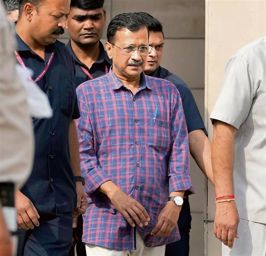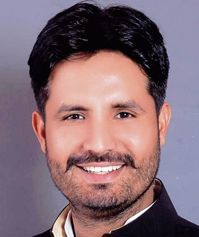
Illustration: Sandeep Joshi
Harish Khare
Today, we are observing Gandhi Jayanti. We will perform the usual rituals, with the constitutional dignitaries putting in a ceremonial appearance at the Raj Ghat. And then, everyone will go back to business as usual.
The hustle and bustle of the “VIP movement” would not permit any of these constitutional dignitaries to pause and read the Mahatma’s talisman that is engraved in stone at the entrance to the Samadhi: “I will give you a talisman. Whenever you are in doubt, or when the self becomes too much with you, apply the following test. Recall the face of the poorest and the weakest man whom you may have seen, and ask yourself, if the step you contemplate is going to be of any use to him. Will he gain anything by it? Will it restore him to a control over his own life and destiny? In other words, will it lead to Swaraj for the hungry and spiritually starving millions? Then you will find your doubts and your self melt away.”
These are the words which every prime minister and every chief minister should read first thing each day.
Gandhi Jayanti should be an occasion to remind us all why the Mahatma was killed and by whom. In a way, the country finds itself having to revisit the saint’s assassination.
Before and after Partition, the Hindu right wing and its various outfits such as the Hindu Mahasabha and Rashtriya Swayamsevak Sangh have been dead opposed to the Mahatma and his politics. These voices and forces are unable to appreciate the Mahatma’s firm and unequivocal opposition to the demand for a Hindu raj.
It was this ideology of Hindu exclusiveness and supremacy that had poisoned the mood and the minds. Nathuram Godse, who shot the Mahatma dead, was merely a representative of those fanatical ideas and ideologues.
After Gandhi's murder, Nehru picked up the Mahatma’s mantle. And that is why he was and is continued to be disliked, demonised and calumniated by the communal voices.
It was Jawaharlal Nehru’s relentless counter-argument to the Hindu Mahasabha ideology that ensured that India emerged as a modern nation. As a true disciple of the Mahatma, Nehru educated the nation in the values of secularism, tolerance, togetherness, pluralism and egalitarianism. And, hence, the unrelenting assault on “Nehruvian India.”
For the first time, we have a government at the Centre that takes pride in its ideological and spiritual links to the Rashtriya Swayamsevak Sangh. The Modi government finds itself hemmed in by the Constitution of India, but its functionaries are forever looking for ways and means of earning approval from the Nagpur bosses. It is now common for the Central ministers to seek guidance and direction from the RSS mentors. What is more, there is no attempt to keep this interaction secret. The RSS connection is openly flaunted. The clever strategists think that they can appropriate the Mahatma for their narrow sectarian project.
Those who wish to roll back the march of the communal agenda would need to renew and refresh their own knowledge of the Mahatma and his message.
Last Tuesday morning, people across the globe watched the first American presidential debate of the current electoral campaigning. It also meant that the countdown of the Obama presidency had started. Come the third week of January, and Barrack Obama would be gone as the President of the United States. And, he would be just 56 years old. What will he do the rest of his life?
Just a few days ago, we learnt that David Cameron has resigned from his seat in the House of Commons. Earlier in July, he had had to step down as Prime Minister after Britain had rejected his advice and, instead, voted to move out of the European Union. He has opted out of political life. He is not yet 50.
The young, throughout the ages, have sought to push the old aside and lay a claim to leadership. And then, they, in turn, themselves get pushed around.
Just think Kennedy was barely 43 years old when he became President of the United States. And had he not been assassinated in Dallas, he would have retired at the young age of 51.
Bill Clinton was 46 at the time of his elevation to the White House in 1992 and 54 at the time of his departure from that lovely house.
Across the Atlantic, Tony Blair was 44 when he became Prime Minister and only 54 when he left 10, Downing Street.
By these standards, Modi is an old man. He was 64 when he became Prime Minister and looked young only in contrast to a rather old Manmohan Singh.
This dilemma does not present itself to the politicians in India because they just do not retire. Nor are they allowed to be left alone. A public career leaves a politician almost incapable of being employed anywhere. Only a handful of lawyers, including P Chidambaram, Kapil Sibal and Arun Jaitley, are able to return to the court and make a decent living.
We value age and its presumed advantages of experience and wisdom. We have had some very old men as prime minister. Morarji Desai, Charan Singh, PV Narasimha Rao, IK Gujral, AB Vajpayee were old men.
We have also had some become prime minister at a rather young age.
Indira Gandhi was 49 in 1966 when she first became prime minister and Rajiv was just 40 when he donned that mantle.
Curzon was only 40 when he arrived to take over as Viceroy, and for that matter, Al Capone was not even 35.
Old age does not necessarily handicap a leader. Deng Xiaping was an elderly man when he turned China around, and so was PV when he set India on the course of economic transformation.
A couple of months ago, Dr Satish K Kapoor kindly presented me his new book, Hinduism — The Faith Eternal. The book is published by the Kolkata-based Advaita Ashram and Swami Shuddhidananda is the editor of the book.
It is a serious as well as substantive book on a subject that still remains only partially understood. The editor, in the preface, argues that “at the core of every religion exists the same eternal Truth.” And he cites Swami Vivekananda’s observation on “the germ of religion.” According to Swami Vivekananda, religion, at its core, is a human being’s “struggle to transcend the limitations of senses.”
Dr Kapoor has done a competent job of explaining Hindu insights in the context of the practices of the modern world and times. He is particularly lucid on Swami Vivekananda’s views.
I particularly liked Dr Kapoor’s explanation of the concept of service in the Vedas and how these remain workable for our conflict-ridden times. He quotes the Rig Veda: “May we always serve humanity without demanding the price of our service. May we ever be benevolent, kind, self-serving, detached and adjusting. May we surrender all and serve humanity like the sun and the moon.”
Can there be any teaching more profound?
Last Sunday, I received an interesting communication from a friend, who recently retired as secretary to the Government of India. The previous day, it seems, there was a prayer meeting in Delhi for the mother of Ajit Seth, a former cabinet secretary. The attendance was rather disappointing, compared to the turnout at the prayer meeting for Seth’s mother-in-law (held at the same venue a while ago when he was still the Cabinet Secretary). This time, only one serving officer cared to attend the condolence meeting.
My bureaucrat friend was sufficiently upset at this painful reminder that it is the “chair” that seems to drive social behaviour. He indignantly asked: “What has happened to the concept of cadre loyalty?” Seth belongs to the UP cadre of the IAS, and it is the largest cadre in the country and has, at any time, a very large number of officers on deputation in Delhi. Seth’s colleagues from UP were conspicuous by their absence.
Another senior bureaucrat framed the issue rather pithily: “The lady who died this week was the mother of an ex-cabinet secretary; the lady who died last year was the mother-in-law of the serving cabinet secretary.”
Delhi is a very matlabi city. The only currency of exchange it knows is of power. No one makes friends, only acquaintances.
Here is a non-matlabi invitation for coffee. Please join me.



























